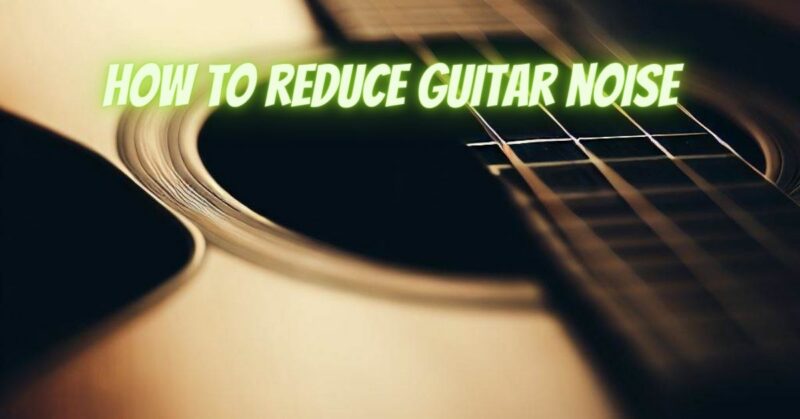Guitar noise, such as unwanted hum, buzz, or interference, can be frustrating for guitarists, affecting the overall sound quality and performance. Fortunately, there are various steps you can take to minimize or eliminate guitar noise, allowing you to enjoy a clean and noise-free sound. In this article, we’ll explore practical tips and techniques to help you reduce guitar noise and achieve a pristine playing experience.
- Check Grounding and Wiring:
Grounding issues are a common cause of guitar noise. Inspect the internal wiring of your guitar and ensure all connections, especially grounding points, are secure and free from loose or damaged wires. Resolder any loose or faulty connections, and ensure that the guitar’s internal electronics are adequately grounded.
- Use High-Quality Cables:
Using high-quality, shielded cables can significantly reduce unwanted noise and interference. Invest in reliable cables with good shielding to ensure clean signal transmission between your guitar, pedals, and amplifier.
- Shield the Electronics Cavity:
Adding conductive shielding material inside the guitar’s electronics cavity can minimize external electromagnetic interference, reducing noise and buzz. Shielding the guitar’s control and pickup cavities helps to block unwanted signals from affecting the guitar’s electronics.
- Upgrade to Noiseless Pickups:
If you’re using single-coil pickups and experiencing excessive hum or noise, consider upgrading to noiseless pickups or humbuckers. These pickup types are designed to reduce interference and offer a quieter signal.
- Reduce Pedal Chain Noise:
If you use pedals in your signal chain, the order and quality of the pedals can impact noise levels. Place noise-generating pedals like fuzz or distortion closer to the amplifier, and use high-quality, low-noise pedals to maintain a cleaner signal path.
- Minimize Electromagnetic Interference:
Avoid placing your guitar near sources of electromagnetic interference, such as lighting fixtures, computer monitors, or other electronic devices. Electromagnetic interference can cause hum and buzzing in your guitar signal.
- Properly Position and Shield Amps:
Position your amplifier away from your guitar and other noise sources to reduce the risk of interference. If you’re using a tube amp, make sure it’s adequately shielded to minimize unwanted noise.
- Check and Maintain Your Instrument:
Regularly check and maintain your guitar, including cleaning the pickups, output jack, and switches. Keeping your instrument in good condition can help reduce noise caused by dirt or debris.
- Use Noise Reduction Pedals or Processors:
Noise reduction pedals or processors can effectively suppress unwanted noise in your signal chain. These pedals analyze your guitar’s signal and reduce noise during silent moments, resulting in a cleaner overall sound.
- Consult a Professional:
If you’ve tried various methods and are still experiencing excessive guitar noise, consider seeking help from a qualified guitar technician or audio engineer. They can diagnose the issue more accurately and provide tailored solutions to reduce noise effectively.
Reducing guitar noise is essential for achieving a clean and noise-free sound during your playing and performances. By checking grounding and wiring, using high-quality cables, shielding the electronics cavity, upgrading to noiseless pickups, and minimizing interference sources, you can significantly reduce unwanted noise and enjoy a pristine playing experience. Regular instrument maintenance and the use of noise reduction pedals or processors can also help maintain a clean signal. If you encounter persistent guitar noise despite your efforts, don’t hesitate to consult a professional for further assistance and to ensure your guitar setup is optimized for the best possible sound quality.


